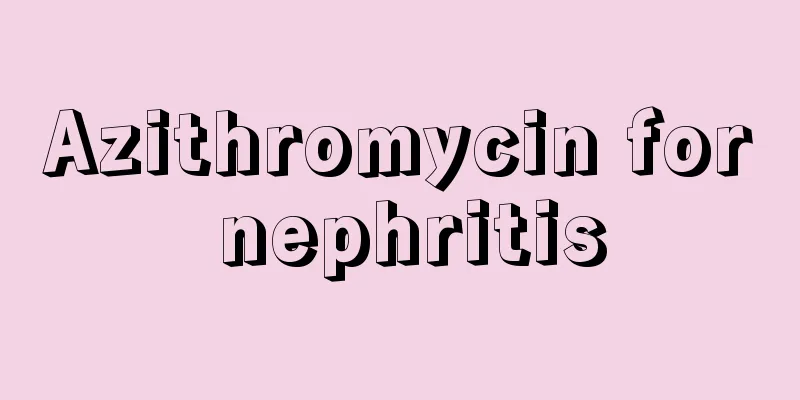Azithromycin for nephritis

|
Azithromycin is a drug that can be used to treat inflammation. Since it can be used to treat inflammation, some patients with nephritis may also use this drug for treatment. People believe that since azithromycin can be used to treat inflammation, it should also be effective for nephritis. Will azithromycin be effective in treating nephritis? Let’s give you a detailed analysis below. Azithromycin does not treat nephritis. 1. Azithromycin tablets Azithromycin tablets are indicated for the following infections caused by sensitive bacteria: lower respiratory tract infections such as bronchitis and pneumonia; skin and soft tissue infections; acute otitis media; upper respiratory tract infections such as sinusitis, pharyngitis, and tonsillitis (penicillin is a commonly used drug for the treatment of purulent streptococcal pharyngitis and for the prevention of rheumatic fever. Azithromycin can effectively eliminate streptococci in the oropharynx, but there is currently no data on the efficacy of azithromycin in the treatment and prevention of rheumatic fever). Azithromycin can be used for simple genital infections caused by Chlamydia trachomatis in sexually transmitted diseases in men and women. Azithromycin can also be used for simple genital infections caused by non-multidrug-resistant gonococci and chancroid caused by Haemophilus dukei (coinfection with Treponema pallidum must be excluded). 2. Nephritis Nephritis is a non-suppurative inflammatory lesion of the kidneys on both sides. Damage to the renal corpuscles can cause edema, hypertension, proteinuria and other symptoms, which is the most common type of kidney disease. There are many types of nephritis, including acute (glomerular) nephritis, chronic (glomerular) nephritis, pyelonephritis, latent nephritis, Henoch-Schönlein purpura nephritis (purpuric nephritis), and lupus erythematosus nephritis (lupus nephritis). Nephritis is an immune disease and an inflammatory response mediated by the kidney immune system. Different antigenic microorganisms infect the human body, producing different antibodies that combine into different immune complexes and deposit in different parts of the kidney, causing pathological damage and forming different types of nephritis. 3. Treatment of nephritis General treatment This includes avoiding fatigue, removing predisposing factors such as infection, and avoiding contact with nephrotoxic drugs or poisons. Adopt a healthy lifestyle (such as quitting smoking, exercising moderately, and controlling emotions) and a healthy diet. During the acute phase, you should rest in bed and gradually increase your activity after the clinical symptoms improve. A low-salt diet (less than 3g per day) should be given during the acute phase. People with normal renal function do not need to limit protein intake, but in cases of azotemia, protein intake should be limited, and high-quality animal protein should be the main source. People with oliguria should limit their fluid intake. Treatment directed at cause and pathogenesis Treatment targeting the immune pathogenesis often includes glucocorticoids and immunosuppressants. Blood purification treatments such as plasma exchange and immunoadsorption can effectively remove autoantibodies and antigen-antibody complexes from the body. Treatment targeting non-immune pathogenesis, including hypertension, hyperlipidemia, hyperglycemia, hyperuricemia, obesity, proteinuria, intrarenal hypercoagulable state, renin-angiotensin system activation, and oxidative stress. Renin-angiotensin system blockers, such as ACEI/ARB, are one of the most important therapeutic measures to slow the progression of kidney disease. Treatment of comorbidities and complications Patients with kidney disease often have multiple comorbidities, such as metabolic abnormalities, hypertension, coronary heart disease, heart failure and cirrhosis, which may aggravate the progression of kidney disease and should be actively treated. Complications of kidney disease may involve various systems, such as infection, abnormal coagulation function, renal hypertension, renal anemia, renal osteodystrophy, water, electrolyte and acid-base imbalance, acute left heart failure, pulmonary edema and uremic encephalopathy, and should be treated actively. Renal replacement therapy Including dialysis treatment and kidney transplantation. When acute or chronic renal failure occurs and dialysis is indicated, dialysis treatment should be given promptly. There are two types of dialysis treatment: peritoneal dialysis and hemodialysis. |
<<: Why do patients with kidney disease take hormones
>>: How long does it take to recover after laser scar removal
Recommend
The efficacy and function of black tea mask
Facial masks are a must-have skin care product fo...
How to care for tarsal dysfunction?
Patients with tarsal dysfunction must pay attenti...
What are the dietary principles for patients with vitiligo
Vitiligo is a relatively stubborn skin disease. P...
What are the clinical manifestations of renal tuberculosis?
We need to pay attention to the clinical symptoms...
Red blood classification
The symptom of red blood streaks is quite common ...
Is lung cancer hereditary? If you want to know the hereditary nature of lung cancer, please read these points
In the past, everyone believed that "lung di...
What foods can effectively prevent liver cancer? These foods can effectively prevent liver cancer
Bitter melon plays an important role in human hea...
Can I eat walnuts if my blood sugar is high?
The unsaturated fatty acids contained in walnuts ...
Will gastrointestinal cancer cause bleeding in urine?
Gastrointestinal cancer generally does not direct...
Birth control pills can prevent uterine cancer
After suffering from endometrial cancer, did you ...
What are the types of thyroid cancer? What are the dangers of thyroid cancer?
Specific types of thyroid cancer include: papilla...
What is skin cancer pathology examination
Patients with skin cancer do not need to be too a...
What diseases can be checked in the hematology department
Blood is very important to the human body, and bl...
Is conjunctivitis the same as pink eye? Ophthalmologists answer this question
Conjunctivitis is a very common eye disease, and ...
After taking a shower, I got red bumps on my body
Sometimes after taking a shower, small red bumps ...









